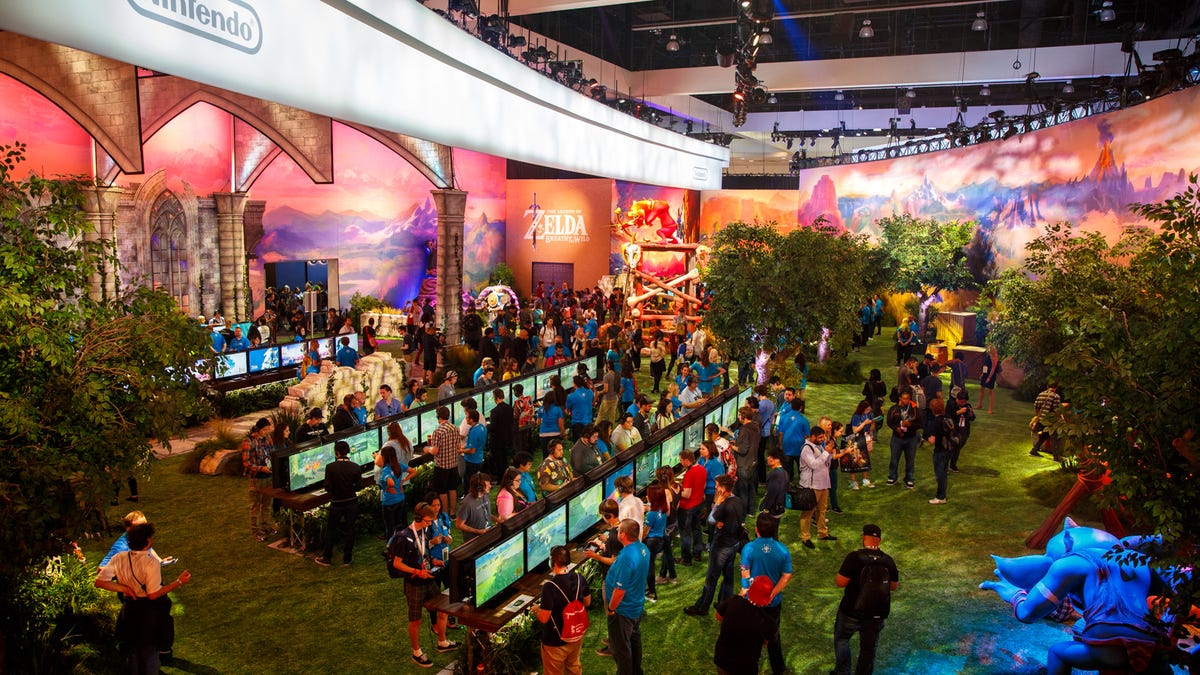E3 is too good to keep it hidden away from the public
Commentary: To rescue this long-running trade show from irrelevance, open it up to the fans.

For followers of the multi-billion-dollar PC and console gaming industry, tracking the ups and downs of the annual E3 show has been a favorite parlour game for many years. After all, this once-a-year event has morphed from being a traditional trade show for industry insiders to a series of bombastic showcases intended to drum up excitement from consumers who now watch nearly every major event streamed live online.
This evolution took a few detours along the way, however. In 2007, the growing costs of putting on the show prompted the major game companies to retrench, falling back from the Los Angeles Convention Center (E3's home since 1999) to a series of hotel meeting rooms in Santa Monica, and a much smaller list of invited guests.
The following year, E3 was back at its traditional home, but without a proper show floor and only about 5,000 attendees -- a far cry from the 70,000-plus of previous years.
From there, E3 slowly grew back into a major event, with last year's show hosting nearly 50,000 people, but it feels as if change is in the air again. Overheard more than once during the week was the question, "Is E3 still relevant?" But the real question behind the question may actually be: "Is E3 reaching the right audience?"
Each of the major press conferences, from Bethesda, Electronic Arts, Sony, Microsoft and Ubisoft was streamed live online, and watching and covering the news was arguably easier when viewing from a comfortable offsite location than queuing up to sit in cramped a seat and struggle with spotty Wi-Fi (many of my colleagues have been saying the same thing about press conferences and keynotes from companies such as Apple and Google for some time).
In fact, the media is no longer the true target audience for these press events -- it's the game-playing public tuning in on their laptops and tablets -- and game companies are shifting towards skipping the media middleman and pitching their wares directly to the public. In the case of Bethesda, publisher of games such as Fallout 4 and Doom, it extended to hiring former G4tv hosts Adam Sessler and Morgan Webb to host a talk-show-press-conference for the streaming audience.
And there's nothing wrong with that. In fact, the industry should go one step further and make the next logical leap, opening E3 up to the public. It's a transformation already underway, if you watch closely enough.
This year, EA, one of the major game publishers, left its long-time home at the Los Angeles Convention Center to instead put on EA Play, an open-to-the-public showcase housed just across the street from E3.
Most of the major press conferences, besides streaming to the public, opened a portion of their seats to an imported cheering section of fans and directed their presentations to them, rather than the media (nary a sales stat was mentioned by Microsoft or Sony).
While official attendees need to have some level of connection to the industry to qualify for a free attendee badge, it's obvious most of the people jamming the halls of the show are primarily gamers and fans. The ESA, the trade group that puts on the show, also held a smaller, separate fan-based event at different location, calling it E3 Live. At the "real" E3, attention is also now being paid to a growing number of influencers who occupy a new social media and video-streaming space somewhere between consumer and press. They, rather than the traditional media, are the coin of the realm now.
And while it's easy to be annoyed at having to elbow past thousands of starstruck fans (most of whom are probably 15-20 years my junior), I was struck by just how much fun they were having, treating E3 like QuakeCon, comic conventions or PAX. Their enthusiasm was great to see, and if E3 is starting to feel like just another big public celebration of fanhood, there's really nothing wrong with that.
In fact, this is not even the first time I've proposed simply flinging the doors to E3 open to everyone. Back in 2010, when the future relevance of the show was again in question (it's an issue that seems to pop up once or twice a decade), I wrote "Modest proposal: Open E3 to public," in which I pointed out:
Why not throw open the doors to the public and make it the World's Fair of video games? It's an open secret that the halls have always been crowded with snuck-in friends and fans, so why not make it official?
In the six years since I wrote that, the way we cover tech and game news has changed. Now everyone is watching the same live video stream, and fans at home have the same (or better) views than we media types in the audience. In some cases, the biggest tech and game companies are choosing to skip traditional trade shows to host their own one-off showcase events (the big annual CES show is seeing some of this as well).
The public is already there, as invited guests at press conferences, finding ways to snag show floor passes, or simply watching everything streamed live online. So, why not embrace that real target audience for today's E3: the gamers? And if we lose our little exclusive club by opening the doors to everyone, so be it.

